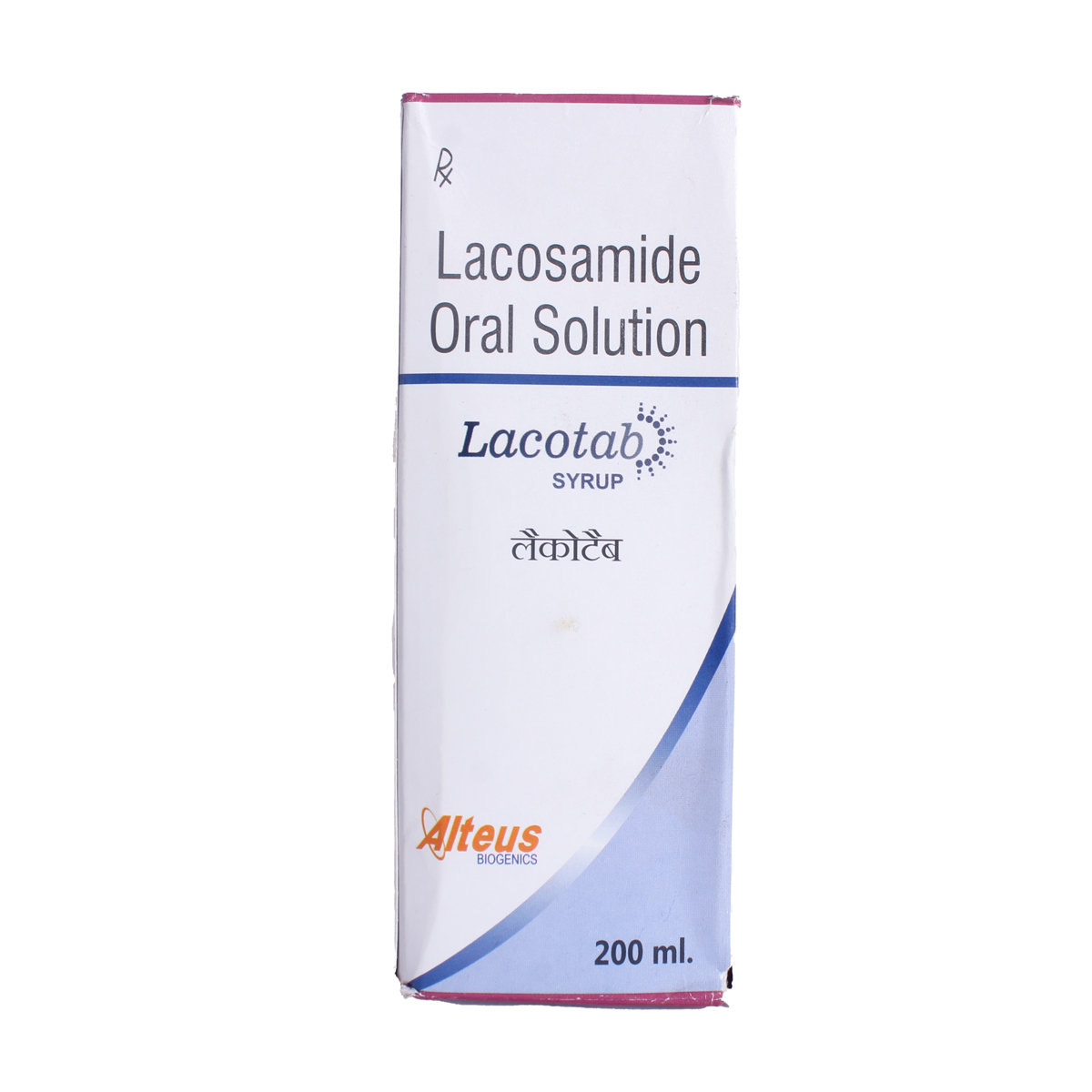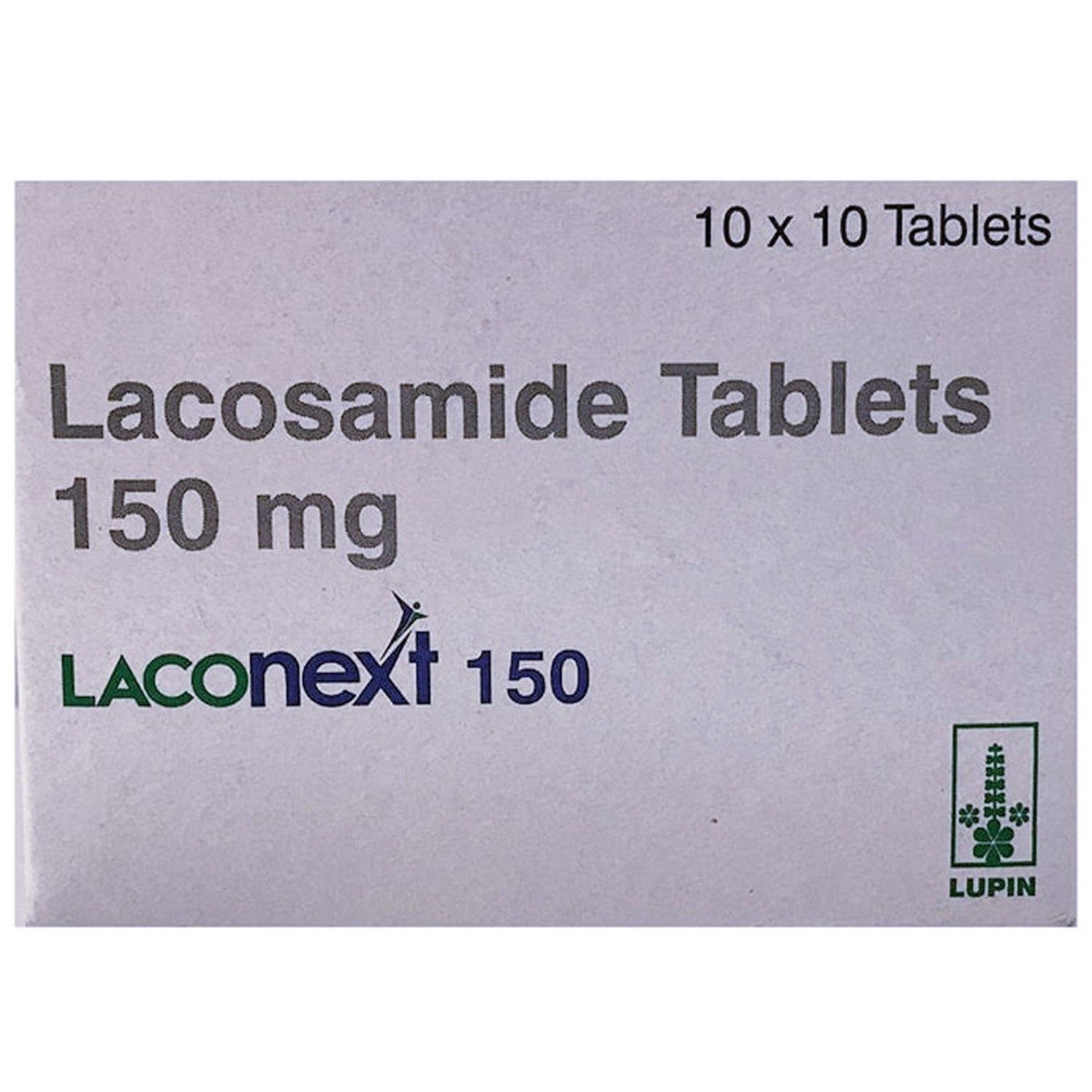Lacosamide
About Lacosamide
Lacosamide belongs to the class of anticonvulsants, which is primarily used to treat focal (partial) seizures in adults and children four years of age or older. Focal or partial-onset seizures are characterised by abnormal electrical activity in only one hemisphere of the brain.
Lacosamide contains lacosamide, which treats seizures by decreasing disorganised electrical activity in the brain.
In some cases, Lacosamide may cause side effects like nausea, vomiting, diarrhoea, headache, confusion, dizziness, blurred vision, mood disturbances, fatigue, and trouble walking. Consult your doctor if the side effects persist or worsen over time.
Do not stop taking Lacosamide even if your condition is controlled, as abrupt stopping may cause the recurrence of the seizures. Before taking Lacosamide, inform your doctor if you are using other antiepileptics, prescription or non-prescription drugs.
Uses of Lacosamide
Medicinal Benefits
- Lacosamide effectively treats focal (partial-onset) seizures in adults and children above 4 years of age.
- It inactivates sodium channels in brain cells, reducing abnormal electrical activity.
- This medicine helps stop seizure activity from spreading to other parts of the brain.
- Lacosamide lowers the number and severity of seizure episodes.
- By controlling seizures, it supports better focus, safety, and quality of life.
- It can be used alone or with other antiepileptic medicines for effective seizure management.
Directions for Use
- Lacosamide can be taken with food to help reduce the risk of stomach upset.
- Follow your doctor's instructions on the dosage and timing of this medication.
- Swallow Lacosamide as a whole with a glass of water.
- Do not crush, break, or chew it.
Storage
Side Effects of Lacosamide
- Nausea
- Vomiting
- Diarrhoea
- Dizziness
- Headache
- Drowsiness
- Fatigue
- Blurred vision
- Uncontrollable eye movements
- Impaired coordination
- Uncontrollable movements
- Balance problems
- Pruritus (itching)
- Tremors
- Difficulty walking
- Weakness
Drug Warnings
- Do not take Lacosamide if you are allergic to any of its contents.
- Inform your doctor before taking Lacosamide if you have or have had heart problems, kidney and liver problems, if you have low levels of sodium in your blood or if you are taking medicines that could lower the sodium levels in your blood, or if you are using hormonal contraceptives.
- Do not stop taking Lacosamide without consulting your doctor to avoid precipitating seizures.
- Avoid intake of Lacosamide if you are pregnant or planning for pregnancy unless prescribed by the doctor.
- Nursing mothers should consult the doctor before using the Lacosamide as it may pass into the breast milk and affect the baby.
- Lacosamide causes drowsiness and dizziness, so drive only if you are alert.
- This medicine should not be given to children unless prescribed.
- Avoid consuming alcohol with Lacosamide as it could lead to increased dizziness and sleepiness.
- Consult your doctor immediately if you experience suicidal tendencies.
- Inform your doctor if you use other antiepileptics, prescription or non-prescription drugs, nutritional supplements, or herbal products.
Drug Interactions
Drug-Drug interactions: Lacosamide may interact with HIV medications (atazanavir, saquinavir), opioid medications (buprenorphine), anticancer medications (ceritinib), medicines used to prevent nausea and vomiting caused by cancer chemotherapy (dolasetron), anaesthetic medications (ketamine), used to treat multiple sclerosis (ponesimod, siponimod), medicines used to treat episodes of muscle weakness (sodium oxybate).
Drug-Food interactions: No interactions found.
Drug-Disease interactions: Lacosamide should be used with caution in patients with depression, renal or hepatic impairment and heart conditions.
Drug-Drug Interactions Checker List:
Safety Advice

Alcohol
cautionConsuming alcohol with Lacosamide is not advisable as it may cause unpleasant side effects.

Pregnancy
consult your doctorLacosamide should not be used during pregnancy unless clearly necessary. So, inform your doctor if you are pregnant or suspect pregnancy. Your doctor will weigh the benefits and potential risks before prescribing Lacosamide.

Breast Feeding
consult your doctorLacosamide should not be used in nursing mothers unless clearly necessary. So, inform your doctor if you are a nursing mother. Your doctor will weigh the benefits and potential risks before prescribing Lacosamide.

Driving
unsafeLacosamide may cause a reduction in mental awareness; thus, avoid operating machinery or driving.

Liver
consult your doctorTell your doctor before taking Lacosamide if you have a history of liver disease. Your doctor may adjust your dose depending on your current liver conditions.

Kidney
consult your doctorTell your doctor before taking Lacosamide if you have a history of kidney disease. Your doctor may adjust your dose depending on your current kidney conditions.

Children
cautionIt is used with caution in children above 4 years only when prescribed by a child specialist. It is not recommended for use in children below 4 years of age. The dose of this medicine will be decided by the doctor based on the age and body weight of your child.
Habit Forming
Diet & Lifestyle Advise
- A ketogenic diet (low in carbohydrates and high in fats) is recommended for children with epilepsy. This diet helps utilise fat instead of glucose for energy generation.
- The Atkins diet (high fat and controlled carbohydrates) is recommended for adolescents and adults.
- Exercising regularly helps in maintaining weight and improving overall health.
- Rest well, and get plenty of sleep.
- Avoid smoking and alcohol consumption.
- Meditation and yoga can help lower stress, decrease pain sensitivity and improve coping skills.
- Have a seizure response plan, and help those around you know what to do.
- Prepare your living area; small changes may help reduce the risk of physical injury during a seizure.
- Understand what triggers seizures are and try to reduce or avoid them.
- Please pay attention to overall health, as it can help reduce seizure activity.
- Install an alarm or emergency device to get assistance during a seizure attack.
Patients Concern
Disease/Condition Glossary
Focal or partial-onset seizures are characterised by abnormal electrical activity in only one hemisphere of the brain. Common symptoms of focal seizures are involuntary muscle contractions, followed by relaxation on one side of the body, uncontrolled head or eye movements, a feeling of déjà vu, rapid heart rate, and a tingling sensation on the skin. The symptoms vary in each patient depending on the part of the brain affected.
FAQs
Lacosamide is used to treat focal (partial) seizures in adults and children four years of age or older.
Lacosamide contains lacosamide, which treats seizures by decreasing disorganized electrical activity in the brain.
Lacosamide can cause memory loss and cognitive impairment in some cases. Consult a doctor right away if the condition worsens.
Lacosamide may not cause any weight gain. However, consult your doctor if you notice any abnormal signs while using Lacosamide.
Lacosamide is typically recommended for long-term use. Keep taking the medication as advised by your doctor. However, if you have any unsettling side effects, speak to your doctor.
Lacosamide should also be taken with caution in patients who are taking drugs that influence cardiac conduction, such as sodium channel blockers, beta-blockers, calcium channel blockers, potassium channel blockers, and medications that lengthen the PR interval.
Lacosamide can be given as monotherapy or in combination with other antiepileptic drugs. However, you are recommended not to take any other medications with the Lacosamide on your own without a doctor's recommendation.
The side effects of Lacosamide include headache, double or blurred vision, nausea, dizziness, vertigo (spinning sensation), tremor, uncontrollable eye movements, tingling or muscle spasms. If these side effects persist or worsen, please consult your doctor.
No, do not stop taking Lacosamide even if you feel better. Discontinuing suddenly may worsen your condition and lead to uncontrollable seizures. Therefore, use Lacosamide for as long as your doctor has prescribed it, and if you experience any difficulty while using Lacosamide, please consult your doctor.
Do not drive or use any tools or machines until you know how Lacosamide affects you as it may cause dizziness or blurred vision.
If you missed a dose of Lacosamide, take it within first 6 hours of the scheduled dose. However, if you have forgotten a dose for more than the first 6 hours of the scheduled dose, skip the missed dose and take the next scheduled dose in the prescribed time. Do not double the dose to make up for the forgotten one as this may increase the risk of side effects.
No, Lacosamide is not a habit-forming medicine.
There have been no reports of Lacosamide affecting fertility in either males or females. However, if you have any concerns, please consult a doctor.
Lacosamide is usually not recommended for use during pregnancy or breastfeeding. However, seek doctor’s advice if you are pregnant or breastfeeding.
Excess of Lacosamide may cause nausea, dizziness, vomiting, seizures, and even coma. If somebody takes excess of Lacosamide, seek medical help immediately.
Caution is advised if you are taking Lacosamide while on Ritonavir therapy. It is recommended that you inform your doctor before starting Lacosamide. This is because if you are taking Ritonavir for kidney or liver problems then the dose of Lacosamide needs to be adjusted or reduced.







